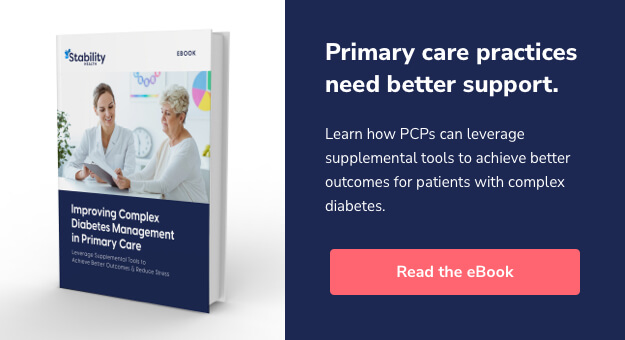
Diabetes Patient Education: Shareable Resources for Clinicians & Patients
Why Diabetes Patient Education is Necessary
The Critical Role of Diabetes Care & Education Specialists
How Diabetes Patient Education Can Help Your Practice
Know Your ABCs: Basic Health Education for Diabetes Patients
Comprehensive Education for Diabetes Patients
Certified Diabetes Care and Education Specialists & Coaches
Why Diabetes Patient Education is Necessary
When people with either type 1 or type 2 diabetes understand how their disease works, they are more empowered to take control over their care between doctor’s appointments. When successful, patient education and proper self-management results in better quality of life and fewer urgent care or hospital visits. Diabetes self-management requires that clinicians support their patients in learning about diabetes causes, risks, and care — but the necessity of disease management beyond the exam room comes with challenges.
Daily diabetes management, while crucial, can be difficult to sustain: Patents must watch what they eat, monitor their blood glucose, and some must self-administer insulin injections multiple times a day. Patients often receive so much information at once about their disease that it can be overwhelming, resulting in inaction. Lack of patient adherence — or lack of disease self-management outside the exam room — directly impacts diabetes treatment outcomes.
Clinicians, too, may not always be aware of their patients’ struggles regarding disease self-management. Beyond the challenge of building new healthy habits, other significant hurdles can include the cost of medications and blood glucose monitoring tools (and/or insulin delivery systems like pumps), disease comprehension, or changes in living situations or general health. Standard appointment times are never long enough to cover all patient concerns or difficulties. Diabetes may also not be the only reason for a patient’s visit to their doctor, so crucial information may be lost or forgotten during an appointment.
These challenges have given rise to a host of patient resources that people with diabetes can access in between their doctor’s appointments. These range from diabetes education specialists to virtual care apps, endocrinologist-reviewed information hubs, or integrated solutions that combine all three . Rather than taking the place of the clinician, these resources help educate patients about their disease, supporting clinicians in delivering more positive health outcomes.
The Critical Role of Diabetes Care & Education Specialists
According to the Association of Diabetes Care & Education Specialists (ACDES), patient education plays a significant role in helping people with diabetes in many ways. Formerly referred to as Certified Diabetes Educators (CDE), highly trained Certified Diabetes Care and Education Specialists (CDCES) play a crucial role in coaching patients on an ongoing basis in:
- Basic information about diabetes and disease management
- Use of diabetes devices, including:
- Blood glucose meters
- Insulin pens
- Insulin pumps
- Continuous glucose monitors
- Adopting healthy eating habits through nutrition education, including:
- Meal-planning
- Weight loss strategies
- Other disease-specific nutrition counseling
- Developing problem-solving strategies and skills to self-manage diabetes
- Monitoring blood glucose and learning how to interpret and appropriately respond to the results
- Understanding how their medications work, including their:
- Actions/purpose
- Side effects
- Efficacy
- Toxicity
- Prescribed dosage and more
- Lowering health expenses due to decreased need for office visits, medication changes, or device upgrades (i.e., learning that there are less expensive options available to them)
- Developing skills for handling stressful situations
- Gaining confidence to embrace their disease with the promise of better health
- Practicing self-advocacy and knowing when to ask for help
There are countless resources that adhere to the ADA Standards of Medical Care in Diabetes that have been optimized for patient consumption and are the most reliable tools for helping patients learn and practice self-management. Though many patients may lack the time or motivation to consume this information on their own, a dedicated health coach can help patients stay motivated throughout their self-management education.
How Diabetes Patient Education Can Help Your Practice
When patients practice active diabetes self-management, they aren’t the only ones who benefit. Clinicians and their organizations also see marked improvements in treatment outcomes, patient self-management adherence, as well as an overall healthier and happier patient population.
Clinical organizations experience the following benefits from patient education:
- Reduced hospital readmissions
- Patients’ ability to self-manage long-term
- Lower costs for the healthcare organization
- Improved quality measures, outcomes, and health at an individual and population level
- Improved productivity and performance for the practice, health system, or health plan
- Decreased workload for triage specialists
- Better patient-provider-care team relationships
- More professional satisfaction
Know Your ABCs: Basic Health Education for Diabetes Patients
For general practitioners in busy clinics, it can be difficult to track down and compile the right resources for patients with diabetes. Especially if a clinician is not a diabetes specialist, they may not know where to start looking for verified resources.
Here are links to a few of the most valuable resources for patients to begin learning self-management habits:
Type 1 Diabetes Patient Education
Centers for Disease Control & Prevention
Type 1 diabetes (diabetes mellitus type 1) most commonly presents in childhood, although about one-fourth of cases are diagnosed in adults. Type 1 diabetes leads to high blood sugars due to a deficiency of insulin (a hormone produced by the pancreas).
Type 2 Diabetes Patient Education
Centers for Disease Control & Prevention
Type 2 diabetes (diabetes mellitus type 2) most often develops in adults but can occur in children as well. Type 2 diabetes leads to high blood sugars due to a combination of insulin resistance and a relative reduction in the pancreas’s ability to secrete insulin.
ABCs of Diabetes
National Institutes of Health
A common acronym in the diabetes community, ABC stands for the regular tests that patients need to complete to assess their overall health status:
-
- A1C: A blood test that tells a patient their average blood sugar control over a period of several months (percentage), with the goal being individualized, but most often <7%.
- Blood Pressure: The measure of the force of circulating blood through the walls of the arteries. The goal is individualized, though most conservatively should be less than 140/90.
- Cholesterol Profile: The amount of good (HDL) and bad (LDL) fat particles present in a person’s blood. LDL goals are individualized, but most conservatively should be less than 100 mg/dl.
NIDDK: Blood Sugar Monitoring
National Institute of Diabetes and Digestive and Kidney Diseases
Patients with type 1 or 2 diabetes need to perform regular blood tests that will tell them their blood sugar levels. Knowing these numbers can help one track factors that alter blood sugar and know if they need to take any action, such as inject insulin or eat a certain food. Tests can either be administered with a lancet or obtained through a wearable subcutaneous sensor.
Signs & Symptoms of Hypoglycemia (Low Blood Sugar)
ACDES
Persons with any type of diabetes can be at risk of their blood sugar levels dropping too low, which can be caused by skipping meals, too little food, alcohol consumption, or certain medications.
Signs & Symptoms of Hyperglycemia (High Blood Sugar)
ADA
Persons with any type of diabetes can experience rises in blood sugar caused by too much food, stress, illness, or a hormone imbalance.
Comprehensive Education for Diabetes Patients
Patients more familiar with basic diabetes care will find value in additional guidance for diet, exercise, and other aspects that contribute to their overall health.
Diabetes Management Overview
National Diabetes Education Program
Patients who are prepared to manage their diabetes must understand the health benefits of the following:
-
- Eating a healthy diet
- Staying active
- Maintaining a healthy weight
- Taking all recommended medications
- Checking blood glucose levels as advised
- Not smoking
- Utilizing mental health resources to manage stress or depression
- Reporting any changes in eyesight to their doctor
- Maintaining proper oral health
- Performing body checks for sores, swelling, or skin blemishes
- Scheduling regular check-ups for eyes, kidney function, and nerves
Exercise Resources to Manage Diabetes
Staying active for 30–60 minutes most days of the week can help lessen the effects of type 2 diabetes. Here are some beginner’s resources for low-impact, at-home workouts:
Foot Care for Diabetes Patients
National Diabetes Education Program
Diabetes can eventually cause numbness in the feet, which can make detecting sores and other injuries more difficult. It’s important for patients to perform regular foot self-checks to prevent infection or permanent damage.
Harvard Healthy Eating Plate
Harvard University School of Public Health
Portioning and creating balanced meals becomes simple when patients can follow a visual guide like the Plate method.
Healthy Eating Habits to Manage Diabetes
ADCES
These guidelines can help patients mitigate the effects of diabetes.
Heart Health & Diabetes
National Diabetes Education Program
Untreated or poorly managed diabetes can lead to a heart attack or stroke. It’s important that patients follow guidelines for maintaining a healthy heart to avoid these complications.
Used Sharps Disposal
SafeNeedleDisposal.org
Most external blood glucose tests involve piercing a small area of skin with a lancet; many people with diabetes also utilize needles for medication administration. Patients should be aware of the safe and proper way to dispose of these sharp materials.
Certified Diabetes Care and Education Specialists & Coaches (CDCES)
A CDCES is a dedicated diabetes education specialist who is a licensed healthcare professional, having received professional training in biology, social sciences, communication, counseling, and best education practices as they relate to diabetes. CDCESs can be a critical part of support and education for people with diabetes, often assisting them between appointments or when unexpected health changes occur.
Diabetes education specialists may practice within a multitude of disciplines; they may be registered nurses, registered dietitians, pharmacists, social workers, behavioral health specialists, or exercise physiologists.
The ADCES provides a locator tool for patients to help them find diabetes educators or centers in their area. This resource is especially valuable since some patients may develop a more comfortable relationship with a coach or education specialist than with their primary clinicians.
Diabetes Patient Education Programs
Though the relationship between a clinician and their patient is one of the most important factors in medicine, busy general practitioners can benefit from supplemental patient education that happens outside the exam room and between appointments. Making these resources available to patients can have invaluable positive effects on patient health, practice finances, and patient and clinician satisfaction.
Here are some of the most comprehensive resource hubs available today:
Stability Health
A unique program that supports both clinicians and patients with diabetes education and support and endocrinologist guidance and validation. Stability Health is powered by a team of diabetes experts that can monitor, assess, and provide recommendations based on patients’ health status and data. Each patient receives a dedicated diabetes health coach who delivers support between clinic appointments. Busy clinicians are supported with up-to-date patient progress, plus endocrinologist recommendations for next steps in management when/if needed.
In addition to providing free educational resources on their website, the ADCES connects patients to accredited diabetes education programs, both ADA and ADCES.
Online support communities
The ADA and CDC both host support groups for people living with diabetes.
Community resources
Patients who may not feel comfortable using digital resources can find in-person support programs through their local YMCA, church, and senior or community centers. A clinician or clinic support staff can help connect patients to these resources.



